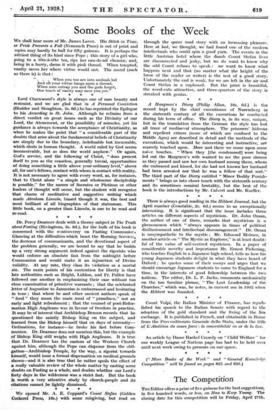Dr. Percy Dearmer deals with a thorny subject in The
Truth about Fasting (Rivingtons, 3s. 6d.), for the bulk of his book is concerned with the controversy on Fasting Communior.
Glancing at the difficulties which beset the Morning Servicer, the decrease of communicants, and the devotional aspect of the problem generally, we are bound to say that he builds up a very strong argument indeed against the rigorists who would enforce an absolute fast from the midnight before Communion and would make it an injunction of Divine validity. At any rate, they class its violation as a mortal sin. The main points of his contention for liberty is that late authorities such as Bright, Liddon, and Fr. Pullen have followed one another in emphasizing their case without too dose examination of primitive warrants ; that the celebrated letter of Augustine to Januarius is embarrassed and hesitating in tone ; that where he and other ancient authors speak of " food " they mean the main meal of " prandium," not an early and light refreshment ; that the counsel of post-Refor- mation High Anglicans was in favour of freedom in practice. It may be of interest that Archbishop Benson records that he questioned the saintly Bishop King on the subject, and learned from the Bishop himself that on days of necessity— Ordinations, for instance—he broke his fast before Com- munion. Dr. Dearmer does not mention this, but the example Of Bishop King still weighs with High Anglicans. It is true that Dr. Dearmer has the custom of the Western Church against him, although the Pope can dispense from the obli- gation—Archbishop Temple, by the way, a rigorist towards himself, would issue a formal dispensation on medical grounds Shown—and it is also true that he rather spoils the effect of a really valuable review of the whole matter by casting some doubts on Fasting as a whole, and doubts whether our Lord's forty days in the wilderness was a strict fast. But the book is worth a very attentive study by church-people and its citations cannot be lightly dismissed. * * * *














































 Previous page
Previous page